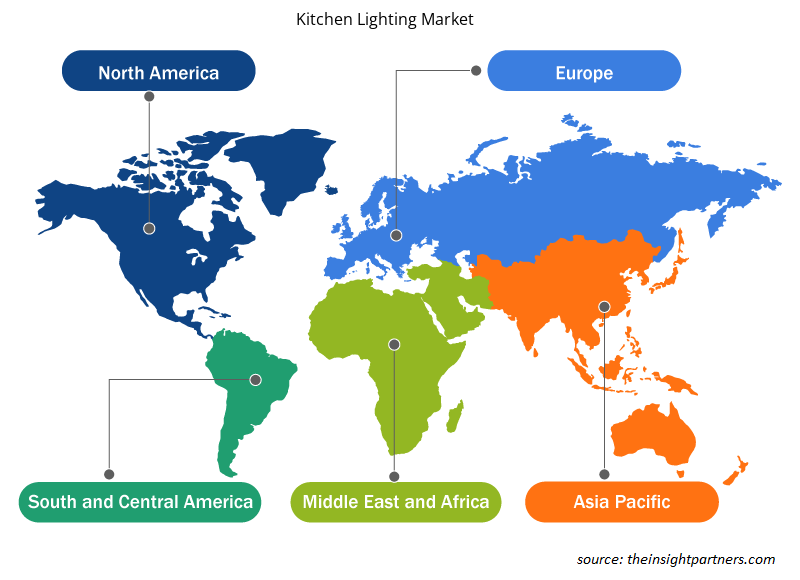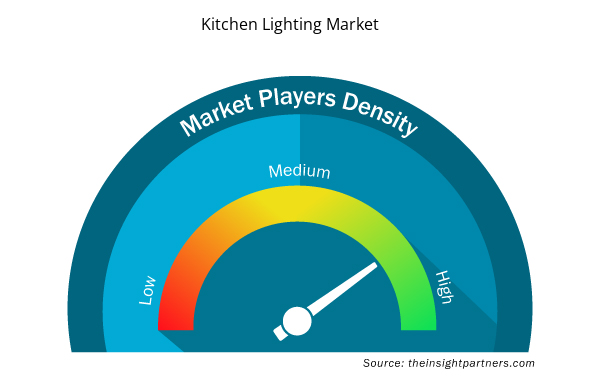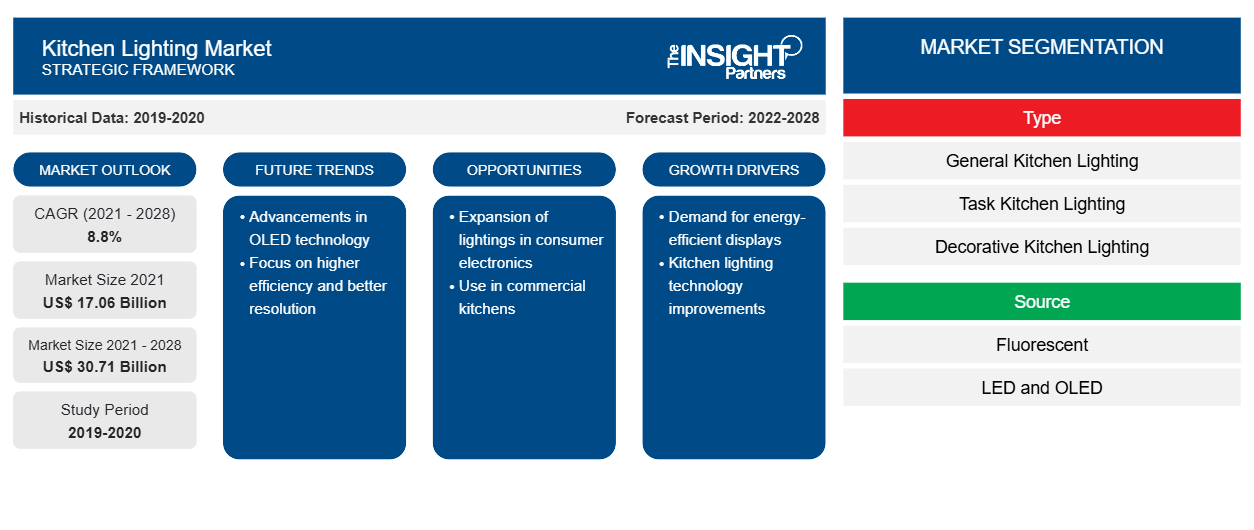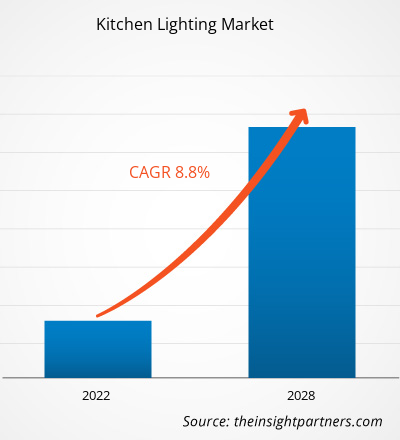预计到 2028 年厨房照明市场规模将从 2021 年的 170.5805 亿美元增至 307.0736 亿美元;预计 2021 年至 2028 年的复合年增长率为 8.8%。
政府政策支持了越来越多的房屋维修和改造活动,尤其是在北美和欧洲。厨房改造在装修项目中的重要性和日益流行的趋势正在创造对厨房照明的巨大需求。例如,根据汉诺威 2021 年家庭装修报告,超过一半(54%)的美国房主在疫情期间进行了房屋装修。根据该报告,疫情期间最受欢迎的家庭装修项目是厨房和浴室,约占总装修项目的 68%。根据美国厨房和浴室协会 (NKBA) 的数据,照明占美国厨房装修平均预算的 0.05%。同样,欧盟委员会在 2018 年至 2021 年期间启动了 EuroPACE 项目,通过结合负担得起的融资和以人为本的技术援助,使所有欧洲人都能轻松、负担得起、可靠地进行家庭装修,这加速了整个欧洲的家庭装修活动。此外,LED 和 OLED 照明作为白炽灯和 CFL 灯泡的节能替代品越来越受欢迎,这也为该地区带来了对新照明概念和照明设计的需求,例如在照明中加入与自然相关的元素。上述因素正在推动厨房照明市场的增长
定制此报告以满足您的需求
您可以免费定制任何报告,包括本报告的部分内容、国家级分析、Excel 数据包,以及为初创企业和大学提供优惠和折扣
- 获取此报告的关键市场趋势。这个免费样品将包括数据分析,从市场趋势到估计和预测。
COVID-19 疫情对厨房照明市场的影响
由于生产停顿和供应链中断,COVID-19 疫情对厨房照明市场的影响短暂出现负面影响。建筑活动和工人流动的限制导致全球对厨房照明的需求下降。例如,爱尔兰政府于 2020 年 4 月至 5 月实施的封锁导致 Mullan Lighting 工厂停产。此外,随着疫苗接种活动的成功实施和建筑活动的重启,厨房照明的生产、供应链和需求正在改善。此次 COVID-19 封锁鼓励住宅客户和企业主选择更节能的厨房照明以减少能源消耗。然而,在 2021-2022 年期间,由于住宅建筑建设增加、供应链系统稳健性提高以及政府激励和政策支持,厨房照明市场表现出韧性。例如,欧盟成员国将改造措施作为危机复苏计划的一部分,这有助于住宅建筑行业恢复势头,甚至超过疫情前的水平,预计2021-2022年的增长率将达到5.7%。
厨房照明:市场洞察
电子商务渗透率不断提高推动厨房照明市场增长
随着互联网在世界许多地区越来越普及,电子商务行业正在快速发展。家电行业电子商务的迅速崛起推动了在线产品销售。美国的电子商务采用率最高。然而,在印度和中国等亚太国家,照明灯具的电子商务正在迅速扩张。批发商控制着全球电子商务销售的大部分(例如,Rexel 在北美、欧洲和亚太地区运营着数十个电子商务网站)。电子零售商,包括全球电子商务平台(如亚马逊和阿里巴巴)、专业照明网站(如 Lampenwelt)和家具网站,是增长最快的行业(如 Wayfair)。只有少数制造商拥有自己的在线商店。制造商、分销商和零售商正在尝试新的在线销售方式,同时保持一致和个性化的客户体验。人工智能、语音商务和移动优化对电子商务日益普及做出了重大贡献。厨房照明行业的制造商、分销商和零售商已经了解了 B2B 电子商务的价值。他们使用人工智能电子商务系统来了解客户的需求,预测他们会购买什么,并利用交易数据作为实时洞察来改善分销和价格。它还根据最近的购买和搜索提供定制体验,使用人工智能和推荐引擎功能提出相关产品推荐,并通过自动化营销工作保持消费者的参与度。通过允许用户通过目录或功能规范以及动态定价和折扣管理产品信息来简化产品管理。它还提供多种付款方式,并确保无缝的退货和换货流程。因此,电子商务行业的快速增长将推动厨房照明市场的需求。
厨房照明
市场 - 基于类型的洞察
根据类型,厨房照明市场分为一般厨房照明、任务厨房照明和装饰厨房照明。一般厨房照明部分在 2020 年占据厨房照明市场的最大份额。大多数人对厨房照明的关注有限,或者不太了解任务照明的重要性。因此,一般照明部分占据市场主导地位。
厨房照明市场 - 基于来源的洞察
根据光源,全球厨房照明市场分为荧光灯、LED 和 OLED。由于全球对节能照明的需求不断增加,LED 和 OLED 部分在 2020 年占据了最大的市场份额。由于 LED 照明具有节省成本的优势,其重要性在过去几年中显著提升
厨房照明市场 - 基于产品的见解
根据产品,市场细分为岛灯、吊灯、天花板灯、枝形吊灯、轨道灯、橱柜下照明等。天花板灯部分在 2020 年占据了最大的市场份额。天花板灯占据市场主导地位,因为它们是住宅建筑中使用的必要照明。然而,厨房改造和装修支出的增加大大增加了对橱柜下照明和吊灯的需求
厨房照明市场的参与者采用并购等策略来维持其市场地位。以下列出了一些主要参与者的发展:
- 2022 年 1 月,Acuity Brands, Inc. 宣布与微软合作。该公司正在扩大与微软的合作。此次合作将有助于 Acuity Brands 的智能照明、照明控制和楼宇自动化解决方案。
- 2020 年 5 月,Cree Lighting 宣布与 Lutron Electronics 合作,在美国扩展照明解决方案。此次合作将把 Cree lighting 的室内和室外照明解决方案与 Lutron 的有线和无线数字灯具技术结合起来。
厨房照明市场区域洞察
Insight Partners 的分析师已详尽解释了预测期内影响厨房照明市场的区域趋势和因素。本节还讨论了北美、欧洲、亚太地区、中东和非洲以及南美和中美洲的厨房照明市场细分和地理位置。

- 获取厨房照明市场的区域特定数据
厨房照明市场报告范围
| 报告属性 | 细节 |
|---|---|
| 2021 年市场规模 | 170.6亿美元 |
| 2028 年市场规模 | 307.1亿美元 |
| 全球复合年增长率(2021 - 2028) | 8.8% |
| 史料 | 2019-2020 |
| 预测期 | 2022-2028 |
| 涵盖的领域 | 按类型
|
| 覆盖地区和国家 | 北美
|
| 市场领导者和主要公司简介 |
|
厨房照明市场参与者密度:了解其对业务动态的影响
厨房照明市场正在快速增长,这得益于终端用户需求的不断增长,而这些需求又源于消费者偏好的不断变化、技术进步以及对产品优势的认识不断提高等因素。随着需求的增加,企业正在扩大其产品范围,进行创新以满足消费者的需求,并利用新兴趋势,从而进一步推动市场增长。
市场参与者密度是指在特定市场或行业内运营的企业或公司的分布情况。它表明在给定市场空间中,相对于其规模或总市场价值,有多少竞争对手(市场参与者)存在。
在厨房照明市场运营的主要公司有:
- ACUITY 品牌公司
- 科锐照明
- 欧司朗照明公司
- GE照明
- 松下电器产业株式会社
免责声明:上面列出的公司没有按照任何特定顺序排列。

- 了解厨房照明市场主要参与者概况
全球厨房照明市场根据类型、来源、产品和地理位置进行细分。根据类型,市场细分为一般厨房照明、任务厨房照明和装饰厨房照明。2020 年,一般厨房照明部分占据了较大的市场份额。根据来源,厨房照明市场细分为荧光灯、LED 和 OLED。2020 年,LED 和 OLED 部分占据了最大的市场份额。根据产品,厨房照明市场细分为岛灯、吊灯、天花板灯、枝形吊灯、轨道灯、橱柜下照明等。2020 年,天花板灯部分占据了最大的市场份额。从地理上讲,厨房照明市场大致分为北美、欧洲、亚太地区 (APAC)、中东和非洲 (MEA) 和南美 (SAM)。2020 年,北美在全球厨房照明市场中占有相当大的份额。
ACUITY Brands Inc.、Cree Lighting、OSRAM Licht AG、GE Lighting、Panasonic Corportaion、Signify Holding、Hubbell Incorporated、Kichler Lighting、Lutron Electronics、Hafele GmbH &Co 是厨房照明市场的主要公司。
- 历史分析(2 年)、基准年、预测(7 年)及复合年增长率
- PEST 和 SWOT 分析
- 市场规模价值/数量 - 全球、区域、国家
- 行业和竞争格局
- Excel 数据集


- Artificial Intelligence in Healthcare Diagnosis Market
- Clear Aligners Market
- Excimer & Femtosecond Ophthalmic Lasers Market
- Enteral Nutrition Market
- Integrated Platform Management System Market
- Virtual Production Market
- Medical Second Opinion Market
- Pressure Vessel Composite Materials Market
- Toothpaste Market
- Health Economics and Outcome Research (HEOR) Services Market

Report Coverage
Revenue forecast, Company Analysis, Industry landscape, Growth factors, and Trends

Segment Covered
This text is related
to segments covered.

Regional Scope
North America, Europe, Asia Pacific, Middle East & Africa, South & Central America

Country Scope
This text is related
to country scope.
常见问题
Increasing proliferation of LED in Kitchen Lighting
Growing Number of Residential Construction Projects
With the continuously growing access to the internet in many regions, the e-commerce industry is flourishing rapidly. Although the US has the largest e-commerce business, the e-commerce for lighting fixtures is expanding at a high pace in India and China. Wholesalers control the majority of global e-commerce sales. Rexel operates dozens of e-commerce sites throughout North America, Europe, and Asia-Pacific. E-tailers, including the global e-commerce platforms such as Amazon and Alibaba; specialized lighting websites such as Lampenwelt; and furniture websites are the fastest expanding segments of the e-commerce business. Manufacturers, distributors, and retailers are experimenting with new ways for making online sales while maintaining a consistent and personalized client experience.
Layered Lighting, Smart Bulbs, Metallic Lights and Triple Pendant Lights, among others are latest trends that are expected in the kitchen lighting market in the coming years.
Key companies in the kitchen lighting market include Acuity Brands, Inc; Cree Inc.; Eaton Corporation; General Electric; Hubbell Lighting Inc; Kichler Lighting LLC; Lutron Electronics Co., Inc; Osram Licht AG; Panasonic Corporation; and Signify Holding.
Based on Type, the kitchen lighting market can be bifurcated into general kitchen lighting, task kitchen lighting, decorative kitchen lighting. The general kitchen lighting segment dominates the market as major adoption in developing and developed nations. The majority of the population has limited concerns about kitchen lighting or is less aware of the importance of task lighting. Thus, the general lighting segment dominates the market. However, with increasing disposable income and investment in kitchen remodeling, the task lighting and decorative lighting market are expected growth with a significant CAGR in coming years.
APAC held the largest market share in year 2020, along with the notable revenue generation opportunities in Europe and APAC.
Trends and growth analysis reports related to Electronics and Semiconductor : READ MORE..
The List of Companies - Kitchen lighting Market
- ACUITY Brands Inc.
- Cree Lighting
- OSRAM Licht AG
- GE Lighting
- Panasonic Corportaion
- Signify Holding
- Hubbell Incorporated
- Kichler Lighting
- Lutron Electronics
- Hafele GmbH &Co
The Insight Partners performs research in 4 major stages: Data Collection & Secondary Research, Primary Research, Data Analysis and Data Triangulation & Final Review.
- Data Collection and Secondary Research:
As a market research and consulting firm operating from a decade, we have published and advised several client across the globe. First step for any study will start with an assessment of currently available data and insights from existing reports. Further, historical and current market information is collected from Investor Presentations, Annual Reports, SEC Filings, etc., and other information related to company’s performance and market positioning are gathered from Paid Databases (Factiva, Hoovers, and Reuters) and various other publications available in public domain.
Several associations trade associates, technical forums, institutes, societies and organization are accessed to gain technical as well as market related insights through their publications such as research papers, blogs and press releases related to the studies are referred to get cues about the market. Further, white papers, journals, magazines, and other news articles published in last 3 years are scrutinized and analyzed to understand the current market trends.
- Primary Research:
The primarily interview analysis comprise of data obtained from industry participants interview and answers to survey questions gathered by in-house primary team.
For primary research, interviews are conducted with industry experts/CEOs/Marketing Managers/VPs/Subject Matter Experts from both demand and supply side to get a 360-degree view of the market. The primary team conducts several interviews based on the complexity of the markets to understand the various market trends and dynamics which makes research more credible and precise.
A typical research interview fulfils the following functions:
- Provides first-hand information on the market size, market trends, growth trends, competitive landscape, and outlook
- Validates and strengthens in-house secondary research findings
- Develops the analysis team’s expertise and market understanding
Primary research involves email interactions and telephone interviews for each market, category, segment, and sub-segment across geographies. The participants who typically take part in such a process include, but are not limited to:
- Industry participants: VPs, business development managers, market intelligence managers and national sales managers
- Outside experts: Valuation experts, research analysts and key opinion leaders specializing in the electronics and semiconductor industry.
Below is the breakup of our primary respondents by company, designation, and region:

Once we receive the confirmation from primary research sources or primary respondents, we finalize the base year market estimation and forecast the data as per the macroeconomic and microeconomic factors assessed during data collection.
- Data Analysis:
Once data is validated through both secondary as well as primary respondents, we finalize the market estimations by hypothesis formulation and factor analysis at regional and country level.
- Macro-Economic Factor Analysis:
We analyse macroeconomic indicators such the gross domestic product (GDP), increase in the demand for goods and services across industries, technological advancement, regional economic growth, governmental policies, the influence of COVID-19, PEST analysis, and other aspects. This analysis aids in setting benchmarks for various nations/regions and approximating market splits. Additionally, the general trend of the aforementioned components aid in determining the market's development possibilities.
- Country Level Data:
Various factors that are especially aligned to the country are taken into account to determine the market size for a certain area and country, including the presence of vendors, such as headquarters and offices, the country's GDP, demand patterns, and industry growth. To comprehend the market dynamics for the nation, a number of growth variables, inhibitors, application areas, and current market trends are researched. The aforementioned elements aid in determining the country's overall market's growth potential.
- Company Profile:
The “Table of Contents” is formulated by listing and analyzing more than 25 - 30 companies operating in the market ecosystem across geographies. However, we profile only 10 companies as a standard practice in our syndicate reports. These 10 companies comprise leading, emerging, and regional players. Nonetheless, our analysis is not restricted to the 10 listed companies, we also analyze other companies present in the market to develop a holistic view and understand the prevailing trends. The “Company Profiles” section in the report covers key facts, business description, products & services, financial information, SWOT analysis, and key developments. The financial information presented is extracted from the annual reports and official documents of the publicly listed companies. Upon collecting the information for the sections of respective companies, we verify them via various primary sources and then compile the data in respective company profiles. The company level information helps us in deriving the base number as well as in forecasting the market size.
- Developing Base Number:
Aggregation of sales statistics (2020-2022) and macro-economic factor, and other secondary and primary research insights are utilized to arrive at base number and related market shares for 2022. The data gaps are identified in this step and relevant market data is analyzed, collected from paid primary interviews or databases. On finalizing the base year market size, forecasts are developed on the basis of macro-economic, industry and market growth factors and company level analysis.
- Data Triangulation and Final Review:
The market findings and base year market size calculations are validated from supply as well as demand side. Demand side validations are based on macro-economic factor analysis and benchmarks for respective regions and countries. In case of supply side validations, revenues of major companies are estimated (in case not available) based on industry benchmark, approximate number of employees, product portfolio, and primary interviews revenues are gathered. Further revenue from target product/service segment is assessed to avoid overshooting of market statistics. In case of heavy deviations between supply and demand side values, all thes steps are repeated to achieve synchronization.
We follow an iterative model, wherein we share our research findings with Subject Matter Experts (SME’s) and Key Opinion Leaders (KOLs) until consensus view of the market is not formulated – this model negates any drastic deviation in the opinions of experts. Only validated and universally acceptable research findings are quoted in our reports.
We have important check points that we use to validate our research findings – which we call – data triangulation, where we validate the information, we generate from secondary sources with primary interviews and then we re-validate with our internal data bases and Subject matter experts. This comprehensive model enables us to deliver high quality, reliable data in shortest possible time.


 获取此报告的免费样本
获取此报告的免费样本